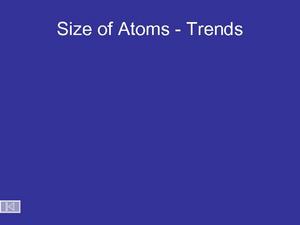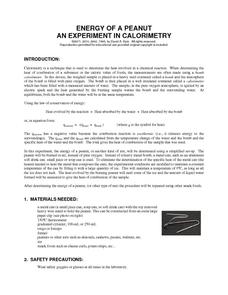Curated OER
Review of Ionic and Covalent Compounds and Transitioning from Ionic to Covalent Compounds
Here is a unique assigment: compare and contrast ionic and covalent compounds in an extensive data table and then analyze Lewis dot structures in antoher. Three columns are to befilled in: "characteristic or feature," "applies to ionic...
Curated OER
The Effect of Dissolved Salt on the Boiling Point of Water
Explore the properties of solutions with a lab activity. Chemistry fans determine the boiling point of water, add salt to create a solution, and then repeat the process four more times. They design their own data table and then graph the...
Curated OER
Properties of Ionic and Covalent Compounds
Test six various reagents for their ability to conduct electricity. Cooperating chemists research whether each is ionic or covalent and discover the relationship between bonding and conductivity. This laboratory exercise would be an...
Curated OER
Displacement Reactions
Five metal samples are tested for their reactivity with different solutions. From the results they discover the order of reactivity for copper, iron, lead, magnesium, and zinc. Have your aspiring chemists perform this laborabory exercise...
Curated OER
Nomenclature Worksheet
As the title suggest, this is an exercise in chemical nomenclature. By completing it, young chemists will practice writing formulas for compounds named, and they will practice naming compounds that are listed by empirical formulas. These...
Curated OER
Energy and States of Matter
Characteristics of each state of matter are listed, the formulas for heating water are detailed, and values for boiling and heat of vaporization are presented. This simple slide show provides direct instruction as well as practice...
Curated OER
Separation Techniques
Wow! Expose your chemistry class to every method of separating mixtures by showing this slide show. Learners will view diagrams and graphic organizers that support notes about filtration, chromatography, distillation, centrifugation, and...
Curated OER
Size of Atoms - Trends
This compendious collection of slides leaves no questions when it comes to the concept of atomic size. Thorough and easy-to-read graphs, tables, and graphics explain atomic radii, the shielding effect, the octet rule, isoelectric...
Curated OER
The Mathematics of Chemical Formulas
Wow! This is one of the most exhaustive presentations on finding chemical formulas that you will come across! Beginning with the basics, and leaving junior chemists with procedures and concrete examples, this PowerPoint certainly...
Curated OER
Chemical Equations and Reactions
Graphic organizers, photos, diagrams, and text bring the world of chemical reactions to life. By viewing this presentation, young chemists learn how to recognize when a chemical reaction has occurred, and how to balance chemical...
Curated OER
Stoichiometry in the Real World
Real world chemical reactions are used as examples for teaching stoichiometry. Viewers work through air bag inflation, fat conversion to water in a camel, rocket fuel combustion, and carbon dioxide removal in spacecraft. Make...
Scholastic
Study Jams! Acids and Bases
This video about pH will not leave a sour taste in your mouth! Through clear explanations and a little humor, upcoming chemists will learn the definitions and properties of acids and bases, as well as how pH is measured. This would make...
American Chemical Society
Comparing the Amount of Acid in Different Solutions
Upcoming chemists use chemical reactions to determine relative pH in two different acids. This is a terrific lesson for middle schoolers that can stand alone as a practice in precision and lab skills, or as part of the unit on chemical...
Curated OER
Grow an Alum Crystal
What an exciting lab experiment to conduct with your high school chemistry class! Crystals are formed naturally in the environment. However, allow your blossoming chemists to create their own unique crystals using alum and...
Beyond Benign
Stoichiometry Challenge
Have you been searching for environmentally friendly chemistry experiments to use in your high school laboratory? This stoichiometry experiment replaces a conventional aluminum to alum lab by using sodium carbonate and calcium...
Rochester Institute of Technology
Heat Transfer
Use an exciting role play activity to teach young chemists about the importance of heat transfer in maintaining homeostasis. They assume the role of a dog sled owner who has been abandoned and must fend for themselves with only a...
Chymist
Energy of a Peanut
Are you nuts? An engaging experiment burns nuts to find their kilocalories. Young chemists analyze at least two different types of nuts with their experimental results versus what is on the package. The resource offers a great lab...
Virginia Department of Education
Matter and Energy: Equations and Formulas
Using simple materials, an informative lesson demonstrates the Law of Conservation of Matter and explains how to balance chemical equations. Young chemists perform experiments, analyze reactions, and balance chemical equations...
Virginia Department of Education
Mystery Iron Ions
Young chemists perform an experiment to determine if a compound is iron (II) chloride or iron (III) chloride. Then they determine the formula, balance the equation, and answer analysis questions.
Virginia Department of Education
The Rate of a Chemical Reaction
If your pupils think a catalyst is a list of their cats, then this might be the lesson for you! Young chemists study the effect of temperature, catalysts, concentration, and particle size on reaction rates during four different...
Virginia Department of Education
A Crystal Lab
Young chemists grow ionic crystals, metallic crystals, and supersaturated crystals in three different lab experiments. Observing these under a microscope allows pupils to compare the various structures.
Chemistry Teacher
Metals, Nonmetals, and Metalloids Lab
What an exciting way to introduce your blossoming chemists to the world of metals, nonmetals, metalloids, and polymers! Here is a lab activity that is designed to allow pupils the opportunity to visualize the reaction of metals,...
American Chemical Society
Energy Foundations
Only 10 percent of an incandescent bulb's energy is used to create light; the remaining 90 percent is heat. In the unit of activities, young chemists examine energy through hands-on activities, videos, discussions, and...
University of Georgia
Endothermic and Exothermic Reactions
Equip your chemistry class with the tools to properly understand endothermic and exothermic reactions. Young chemists collect, analyze, and graph data to determine how the Law of Conservation of Matter is applied to chemical...

























